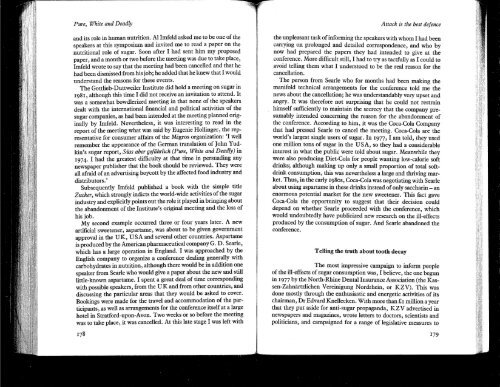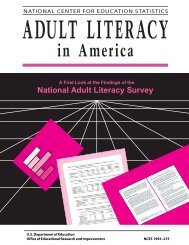John_Yudkin_-_Pure_White_and_Deadly_revised_1986_OCR
John_Yudkin_-_Pure_White_and_Deadly_revised_1986_OCR
John_Yudkin_-_Pure_White_and_Deadly_revised_1986_OCR
Create successful ePaper yourself
Turn your PDF publications into a flip-book with our unique Google optimized e-Paper software.
<strong>Pure</strong>, <strong>White</strong> <strong>and</strong> Deadry<br />
<strong>and</strong> its role in human nutrition. Al Imfeld asked me to be one of the<br />
speakers at this symposium <strong>and</strong> invited me to read a paper on the<br />
nutritional role of sugar. Soon after I had sent him my proposed<br />
paper, <strong>and</strong> a month or two before the meeting was due to take place,<br />
Imfeld wrote to say that the meeting had been cancelled <strong>and</strong> that he<br />
had been dismissed from his job; he added that he knew that I would<br />
underst<strong>and</strong> the reasons for these events.<br />
The Gottlieb-Duttweiler Institute did hold a meeting on sugar in<br />
1981, although this time I did not receive an invitation to attend. It<br />
was a somewhat bowdlerized meeting in that none of the speakers<br />
dealt with the international financial <strong>and</strong> political activities of the<br />
sugar companies, as had been intended at the meeting planned originally<br />
by Imfeld. Nevertheless, it was interesting to read in the<br />
report of the meeting what was said by Eugenie Hollinger, the representative<br />
for consumer affairs of the Migros organization: 'I well<br />
remember the appearance of the German translation of <strong>John</strong> <strong>Yudkin</strong>'s<br />
sugar report, SUss aber gefiihrlich (<strong>Pure</strong>, <strong>White</strong> <strong>and</strong> Deadry) in<br />
1974. I had the greatest difficulty at that time in persuading any<br />
newspaper publisher that the book should be reviewed. They were<br />
all afraid of an advertising boycott by the affected food industry <strong>and</strong><br />
distributors. ' .<br />
Subsequently Imfeld published a book with the simple title<br />
Zucker, which strongly indicts the world-wide activities of the sugar<br />
industry <strong>and</strong> explicitly points 'out the role it played in bringing about<br />
the ab<strong>and</strong>onment of the Institute's original meeting <strong>and</strong> the loss of<br />
hilil job.<br />
My second example occurred three or four years later. A new<br />
artificial sweetener, aspartame, was about to be given government<br />
approval in the UK, USA <strong>and</strong> several other countries. Aspartame<br />
is produced by the American pharmaceutical company G. D. Searle,<br />
which has a large operation in Engl<strong>and</strong>. I was approached by the<br />
English company to organize a conference dealing generally with<br />
carbohydrates in nutrition, although there would be in addition one<br />
speaker from Searle who would give a paper about the new <strong>and</strong> still<br />
little-known aspartame. I spent a great deal of time corresponding<br />
with possible speakers, from the UK <strong>and</strong> from other countries, <strong>and</strong><br />
discussing the particular areas that they would be asked to cover.<br />
Bookings were made for the travel <strong>and</strong> accommodation of the participants,<br />
as well as arrangements for the conference itself at a la~ge<br />
hotel in Stratford-upon-Avon. Two weeks or so before the meetmg<br />
was to take place, it was cancelled. At this late stage I was left with<br />
178<br />
Attack is the best defence<br />
the unpleasant task of informing the speakers with whom I had been<br />
carrying on prolonged <strong>and</strong> detailed correspondence, <strong>and</strong> who by<br />
now had prepared the papers they had intended to give at the<br />
conference. More difficult still, I had to try as tactfully as I could to<br />
avoid telling them what I understood to be the real reason for the<br />
cancellation.<br />
The person from Searle who for months had been making the<br />
manifold technical arrangements for the conference told me the<br />
news about the cancellation; he was underst<strong>and</strong>ably very upset <strong>and</strong><br />
angry. It was therefore not surprising that he could not restrain<br />
himself sufficiently to maintain the secrecy that the company presumably<br />
intended concerning the reason for the ab<strong>and</strong>onment of<br />
the conference. According to him, it was the Coca-Cola Company<br />
that had pressed Searle to cancel the meeting. Coca-Cola are the<br />
world's largest single users of sugar. In 1977, I am told, they used<br />
one Inillion tons of sugar in the USA, so they had a considerable<br />
interest in what the public were told about sugar. Meanwhile they<br />
were also producing Diet-Cola for people wanting low-calorie soft<br />
drinks; although making up only a small proportion of total softdrink<br />
consumption, this was nevertheless a large <strong>and</strong> thriving market.<br />
Thus, in the early 1980s, Coca-Cola was negotiating with Searle<br />
about using aspartame in these drinks instead of only saccharin - an<br />
enormous potential market for the new sweetener. This fact gave<br />
Coca-Cola the opportunity to suggest that their decision could<br />
depend on whether Searle proceeded with the conference, which<br />
would undoubtedly have publicized new research on the ill-effects<br />
produced by the consumption of sugar. And Searle ab<strong>and</strong>oned the<br />
conference.<br />
Telling the truth about tooth decay<br />
The most impressive campaign to inform people<br />
of the ill-effects of sugar consumption was, I believe, the one begun<br />
in 1977 by the North-Rhine Dental Insurance Association (the Kassen-Zahnartzlichen<br />
Vereinigung Nordrhein, or KZV). This was<br />
done mostly through the enthusiastic <strong>and</strong> energetic activities of its<br />
chairman, Dr Edvard Knellecken. With more than £1 million a year<br />
that they put aside for anti-sugar propag<strong>and</strong>a, KZV advertised in<br />
newspapers <strong>and</strong> magazines, wrote letters to doctors, scientists <strong>and</strong><br />
politicians, <strong>and</strong> campaigned for a range of legislative measures to<br />
179



